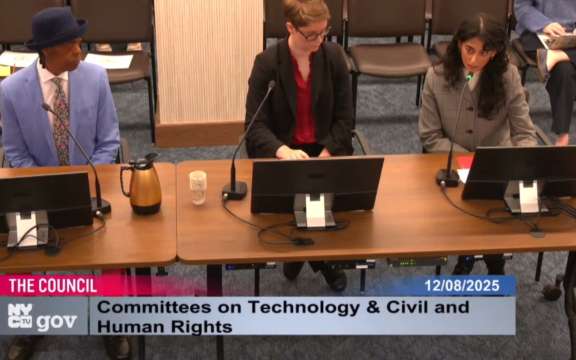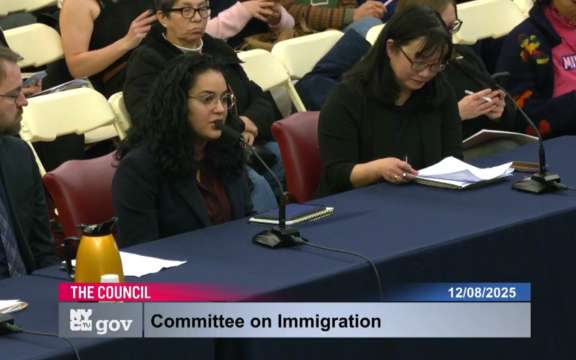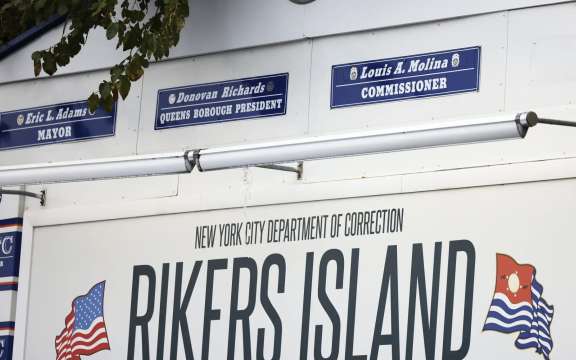BDS Testimony Presented Before New York City Council on Day Fines Pilot and Collateral Consequences
TESTIMONY OF:
Lindsey Smith - Special Litigation Practice
BROOKLYN DEFENDER SERVICES
Presented before
The New York City Council Committee on Justice System
Committee on Governmental Operations
Oversight Hearing on Day Fines Pilot and Collateral Consequences
December 11, 2019
My name is Lindsey Smith and I am a Youth Justice Debt Fellow in the special litigation practice of Brooklyn Defender Services (BDS). Our organization provides multi-disciplinary and client-centered criminal defense, family defense, immigration, civil legal services, social work support and advocacy in tens of thousands of cases involving indigent Brooklyn residents every year.
I thank the New York City Council Committee on Justice System and Committee on Governmental Operations, and in particular Chairperson Rory Lancman and Chairperson Fernando Cabrera, for the opportunity to testify about day fines and collateral consequences of drug arrests and convictions.
I. PROPOSED DAY FINE PILOT PROGRAM {T2019-5491 - Johnson)
As an organization that serves people in poverty who are arrested, we oppose fines and other monetary punishments that do not take into account our clients' ability to pay. On any given day, hundreds of indigent people plead guilty to crimes or non-criminal violations and are saddled with court-imposed fines, fees, and surcharges that they have no realistic ability to pay. These monetary sanctions have a pernicious and regressive impact on the predominately Black, Latinx, and poor people and their families who are targeted by the criminal legal system.1 Fines, like all sanctions, should not have a profoundly more harsh effect on poor people than on people with means found guilty of the same offense. They should not be ruinous to an indigent person, further propelling them into cycles of economic instability, while simply stinging to a person of means. Nor should anyone face incarceration or civil judgment for failing to pay a financial sanction that failed to reflect ability to pay-especially where, as in Brooklyn, 90% of criminal defendants cannot afford an attorney.
The day fines pilot has the potential to alleviate the punishment of poverty by eliminating unaffordable OATH fines. However, we also have very serious concerns about it. Even a proportionate fine regime will not establish a fair and equal punishment system because of the deep inequalities that determine who receives any sanction in the first place. To the extent day fines would be implemented to address so-called "quality of life offenses" that relate to poverty and/or arise largely due to biased enforcement practices, they may only reinforce or help provide cover for injustice. For example, we continue to urge installment of public bathrooms rather than sanctions for public urination, which often impact people without housing. Additionally, the pilot should provide meaningful alternative sanctions for people with no disposable income and should be accessible to people who cannot attend a court date. We do not see any public interest in imposing and enforcing fines for those without money, but at the same time we object to onerous community service obligations, particularly for those with work or family care responsibilities. It is also critical that any day fine program exclude minimum fines and omit any user fees, court fees, or surcharges that would undermine the purpose of tailoring fines to ability to pay. Finally, revenue motives should not come into play in assessing the merits of any pilot program.
We also note that judges have a constant nonwaivable duty to ensure that a penalty they impose is constitutional-even if some summonses adjudicated before OATH have scheduled or purportedly "mandatory" fines.2 This includes ensuring a penalty is not unconstitutionally excessive in consideration of the economic circumstances of the person being punished.3 While day fines are one way to incorporate ability-to-pay in a structured manner, even without this pilot, both OATH and criminal court judges are constitutionally mandated to consider ability-to pay in each and every sentencing decision that includes a financial component, yet they often have failed to do so.
A. Judges Should Consider Ability to Pay Whenever They Impose a Monetary Sanction, At All Levels of the Criminal, Civil, and Administrative Legal Systems, to Prevent Punishment of Poverty
In criminal court, fines are used to punish infractions, misdemeanors, or felonies, sometimes as an alternative to incarceration. (These are distinct from the mandatory surcharges associated with convictions, which we believe are unconstitutional as applied in certain cases and should be waivable, if not abolished.) Given the structural inequalities in our criminal legal system, fines unduly burden poor defendants and their families, disproportionately Black and Latinx people. Currently, New York statute only requires that judges even consider a defendant's financial circumstances when imposing a fine as punishment for a felony.4 In sentencing a defendant for a misdemeanor or violation, no consideration of ability to pay is required by statute.
Imposing a fine beyond the ability of a defendant to pay has a real human cost. Unpaid fines can even result in jail time if a judge determines the person has "willfully" not paid,5 an inquiry which is often informal and based on surface-level impressions. BDS represented one person who was surviving on food stamps and sleeping on friends' couches after losing his job. The judge, seeing the client had a cell phone, determined he was able to pay over $150 in fines and fees and ordered him to do so by the following day. Our clients are also met with skepticism about why they agreed to pay a fine in the first place if they could not afford it. Such a reaction overlooks the precarious financial state of people living paycheck-to-paycheck.6
If a defendant establishes to a court's satisfaction that they cannot pay, judges rarely remove the fines or substitute them with alternatives like programming. Instead, judges will order the person to return in a month or two, sometimes resulting in years of regular court appearances to request more time to pay--each appearance requiring travel to court, taking time off work or loss of employment if time off is not permitted, and organizing and paying for childcare. Very infrequently, judges will convert the fine to civil judgment so the person will not risk jail time for nonpayment. 7 Of course, a civil judgment may have a punitive impact that lasts longer than any jail sentence, negatively affecting employment, access to loans and credit, and even housing for years. Apart from these blatantly punitive outcomes, countless people we represent have paid a fine they truly could not afford rather than face incarceration, forgoing groceries, bills, or even rent.
Worse still, research shows that at the front end, judges sentence poor people to incarceration instead of fining them at disproportionate rates out of a belief that poor people will not pay their fines.8 The availability of day fines in criminal courts could prevent such an egregious result by providing a clear mechanism to tailor fines to ability to pay, but it also has the potential to net widen punishment and the use of fines.
B. Concerns About the Proposed Day Fine Pilot
iRacial and Other Biases and Misuse of Punishment to Address Social Problems
Fines and fees are particularly problematic because of the intentional discrimination, racial bias and stereotyping of Black, Latinx and immigrant communities that lead to the well-documented racial disparities at every stage of the criminal legal system.9 Although tailored day fines may serve as a useful alternative to scheduled fines or incarceration, they should not be used to target behavior that ought not be punished in the first place. For example, some of the low-level offenses moved to OATH via 2016's Criminal Justice Reform Act, such as public urination, open container or being in park after dark, punish poverty-related conduct that often stems from lack of access to resources like housing and warrants greater support, not punishment. Sharp racial disparities in policing "quality-of-life" offenses and the discretion left to NYPD officers to decide whether civil or criminal enforcement is appropriate in each case only exacerbate these problems .10 Rather than using enforcement to extract money out of low-income communities of color, our city should invest in guaranteed housing and jobs, harm-reduction and reparative interventions that reduce interactions with the legal system. 11
ii. Ensuring People Experiencing Poverty Have Meaningful Access to Fair Sanctions
The day fine pilot should be structured in a way that enhances the access people in poverty have to fair sanctions. It should include people with no disposable income, steer clear of any minimum fines, and provide a way for respondents to access alternative sanctions including day fines and community service without having to appear in court.
First, the proposed day fine pilot would set fines based on "daily disposable income." But for some of our clients living below the poverty line or relying on benefits, disposable income is nil. Imposing any fine on a person receiving benefits is often per se excessive because it requires that person to pay money to OATH that the government has determined is necessary for their health and survival.12 These respondents should not be slapped with higher scheduled fines if they have no disposable income with which to calculate a day fine. Instead, the pilot should ensure access to alternatives like connection to supportive services, addressing the root causes of the person's contact with civil enforcement.
Second, and similarly, the pilot should not include any mandatory minimum fines in the day fine scheme. Minimum fines artificially inflate day fines imposed on the lowest-income individuals, undermining the possibility that day fines will reduce unequal punishments across income levels. 13
Third, the proposed pilot should not require OATH respondents to appear in court to access day fines and other alternative sanctions such as engagement in services, as OATH currently requires for eligibility for community service.14 This shuts out respondents who are unable to afford subway fare or childcare, or whose job does not allow them to miss a day. If the goal is to improve substantive equality in sanctions, then the relative benefits of pleading guilty by mail or online should not be limited to those who can afford the scheduled fine.
iii. If Expanded, the Day Fine Program Must Include Elimination of Court User Fees.
Tailoring fines to ability-to-pay is only effective if other monetary sanctions like user fees and court surcharges are also tailored. At least one previous day-fine pilot failed in part because the combined "package" of financial sanctions, including mandatory court fees and surcharges, exceeded the person's ability to pay and undermined the effectiveness of the day fine model. 15 Although mandatory surcharges and fees are not an issue at OATH, criminal courts in New York City continue to impose massive amounts of mandatory surcharges and other user fees on defendants, with less than a third of that ever collected. 16 Judges have no statutory authority to tailor this court debt to defendants' ability to pay at sentencing, 17 likely because they have no penological purpose, but exist only to raise revenue.18 To ensure punishments are truly fair across economic strata, the Council should advocate for the abolition of these mandatory surcharges and fees as well as the tailoring of all punitive fines to meaningful ability to pay.
iv. Revenue Collection Should Play No Role in Punishment Decision.
While we appreciate the inclusion of reporting requirements in the proposed pilot, we urge the Council to refrain from considering revenue in assessing the program's success. Revenue-raising is an illegitimate punitive aim, and the amount of sanctions paid to the city by respondents and their families bears no relationship to whether those sanctions are fair and proportionate.19 Where greater punishment does result in increased revenue, the city must be vigilant that a revenue motive does not distort the fair administration of justice and erode community trust, as it has in other jurisdictions like Ferguson, Missouri.20
C. Conclusion
The punitive legal system's reliance on fines and other monetary sanctions disproportionately extracts wealth from Black and Latinx communities and deepens inequality in New York. Day fines may amount to fairer monetary sanctions, but must be implemented thoughtfully and in line with the above principles. As long as fines are not tailored to income, they remain a regressive punishment for the poor.
1 Office of the N.Y.C. Comptroller, Fees, Fines and Fairness: How Monetary Charges Drive Inequity in New York City's Criminal Justice System (Sept. 10, 2019), https://comptroller.nyc.gov/repo rts/fees-fines-and fairness/#Financial Penalties Imposed in New York State.
2 See Prince v. City a/New York, 966 N.Y.S.2d 16 (App. Div. 1st Dep't 2013); Matter a/Street Vendor Pro). v. City
of New York, 43 A.D.3d 345,346 (App. Div. 1st Dep't 2003).
3 See Cty. of Nassau v. Canavan, 1 N.Y.3d 134, 139 (2003); Prince, 966 N.Y.S.2d.
4 P.L. § 80.00(1).
5 C.P.L. § 420.10; People v. Montero, 480 N.Y.S.2d 70 (App. Term 2d Dep't 1984).
6 Jeanna Smialek, Many Adults Would Struggle to Find $400, the Fed Finds, N.Y. TIMES (May 23, 2019),
https://www .nytimes.com/2019/0 5/23/business/economv/fed-400-do llar-survey.html.
7 C.P.L. §§ 420.10(6), 420.40(5).
8 Beth Colgan, Graduating Economic Sanctions According to Ability to Pay, 103 IOWA L. REV. 53, 99-100 (2017).
9 U.S. Commission on Civil Rights, Targeted Fines and Fees Against Communities of Color: Civil Rights & Constitutional Implications (Sept. 2017),
https://www.usccr.gov/pubs/20 l7/S tatutory En forcement Report20 17.pdf. See also Greg Ridgeway, Analysis of Racial Disparities in the New York Police Department's Stop, Question, and Frisk Practices (Santa Monica, CA: RAND Corporation, 2007), https://www.rand.org/pubs/technical reports/TR534.html.
10 New York City Council, The Criminal Justice Reform Act: One Year Later, https://counci l.nyc. 2:o v/the-criminal justice-re forrn-act-one-year-later/; NYC Dep't of Investigation, Office of the Inspector General for the NY.PD., An Analysis of Quality-of-Life Summonses, Quality-of-Life Misdemeanor Arrests, and Felony Crime in New York City, 2010-2015 (June 22, 2016) 5-6, https://www l .nyc.gov/assets/oignypd/downloads/pd f/Ouality-of-Life-Re port-2010- 2015.pdf (2015 quality-of-life enforcement higher in areas with higher proportions of Black and Latinx residents) .
11 See K. Babe Howell, Broken Lives from Broken Windows : The Hidden Costs of Aggressive Order-Maintenance Policing, 33 N.Y.U. REV. L. & Soc. CHANGE 271 (2009) (noting both the "economic burdens" and " legitimacy costs" that flow from enforcement of low-level offenses); Casey Tolan, How New York City Is Slowly Rethinking Broken Windows Policing, Splinter News (Feb . 3, 2016), https ://sp lintemews.com/how -new-york-city-is-slowly rethinking-broken-windows-p-1793854462.
12 E.g. 7 U.S.C. § 2014 (Supplemental Nutrition Assistance Program reserved for households where financial resources are a "substantial limiting factor" in obtaining a more nutritious diet).
13 Colgan, 103 IOWA L. REV. at 73 n.147.
14 Office of Admin. Trials and Hearings, Clerk's Office FAQ, https://ww wl. nyc.go v/s ite/oa th/clerks-office/clerks office-fag.page#community-service .
15 Colgan, 103 IOWA L. REV. at 79-80.
16 Office of the N.Y.C. Comptroller, Fines, Fees, and Fairness, supra note 1. In 2018, per internal data, Kings County courts imposed approximately $1.51 million in non-punitive fees and surcharges on BDS clients, all of whom had been deemed indigent and too poor to afford an attorney.
17 P.L. § 60.35; People v. Jones, 26 N.Y.3d 730 (2016).
18 People v. Guerrero, 12 N.Y.3d 45, 48-49 (2009).
19 Tina Rosenburg, Instead of Jail, Fines Cut to Fit the Wallet (opinion), N.Y. Times (Oct. 9, 2015), available at https://op inionator.blogs.nytimes.com/2015/10/09/ sc aling-fines-to-what-offenders-can-pay/ .
20 U.S. Dep't of Justice, Civil Rights Div., Investigation of the Ferguson Police Department (Mar. 4, 2015), https:// www.justice.e:ov/s ites/default/files/opa/%20press -releases/attachments/2015/03/04/ferguson police department report.pdf.


